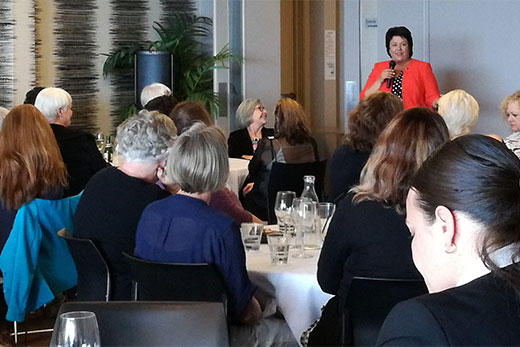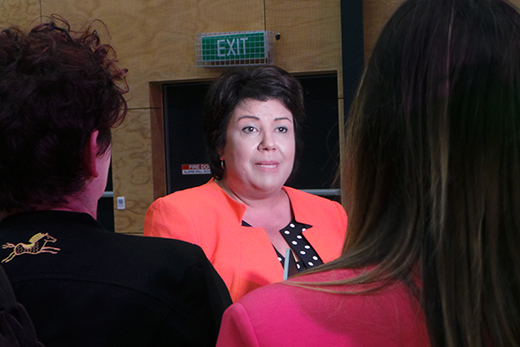National MP Paula Bennett was the guest of honour at a luncheon celebrating women in leadership held in Tauranga this afternoon.
The luncheon, which doubled as a fundraiser for the National Party's Tauranga branch, was the second of two speaking engagements for Paula today after she addressed a large crowd attending the National Māori Housing Conference at ASB Baypark Arena this morning.
National MP Paula Bennett at the National Māori Housing Conference held at ASB Baypark this morning. Photo: Ryan Wood.
Looking back on her own life, the Social Housing, Climate Change and State Services Minister recalls her first job as a dishwasher for an Auckland rest home following her move from Taupō in the early 1990's.
'I've worked for years in pretty hard jobs – people say this job [being a minister] is hard, it's nothing compared to washing dishes in a rest home, or being a care worker. Those are the real hard jobs.
'I was working in a rest home and I met these amazing women who owned the home and the head nurse that ran it. They were these professional women in what I thought were pretty amazing jobs.
'They gave me a much keener sense of myself and what I could achieve. I've always seen those types of women as role models; the ones that are our carers, the ones getting up every day running their families and working their jobs. They made me believe there was nothing I couldn't do.
'I think we've got to support each other a bit and have each other's backs.”

When asked about increasing the number of women in high level positions in New Zealand, Paula says she's more about women working in 'demeaning jobs” who are at times not valued at the level they should.
'I've got less worries about the women in executive roles, I think they can fight for themselves and probably got there but I certainly support them to step up and do what should be done.
'I think there is certainly women who are in pretty tough jobs and are perhaps not getting a fair go. This Government is looking at that and something I think we certainly should be.”
THE LATEST CEDAW REPORT
Earlier this year Women Minister Louise Upston submitted the Government's latest report to the United Nations on New Zealand's efforts to eliminate discrimination against women.
New Zealand is required to periodically report on the country's performance under the Convention on the Elimination of All Forms of Discrimination against Women, which was ratified in 1985.
'Since the last report, women have made steady gains in representation at central and local government level and on statutory boards. Representation at top levels in the private sector has improved, but is still relatively low,” it states
According to the report, of the 120 MPs currently in Parliament, 41 (34 per cent) are women. Ten of 27 are Ministers of the Crown (37 per cent), seven of 20 are Cabinet Ministers (35 per cent), while The Green Party and Māori Party both have women co-leaders.
At a local government level, the proportion of women elected to local bodies has risen from one-quarter to one-third (33 per cent) over the past 25 years, with the number of women candidates also increasing to 31 per cent over that period.
While from 2007 to 2013, the number of women elected as city mayors rose from 19 to 31 per cent.
The number of women chief executives has also increased, and as of June 30, 2015, 41 per cent (12 of 29) of chief executives were women, compared with 24.1 per cent in 2012.
Women also occupied 44.2 per cent of senior leadership positions in the public service (the top three tiers of management) as at June 30, 2015.
But despite an increase in qualifications, women are overrepresented in minimum wage jobs. In 2014, 66.6 per cent of minimum wage earners over 25 were women.
While when it comes to pay, women's median hourly earnings were $21.23 compared with $24.07 for men in the June 2015 quarter – a pay gap of 11.8 per cent.
While the gender pay gap has been trending downwards, and is good by international standards, it has stabilised in the past six years. Reducing it further remains a priority for the Government.



5 comments
It's one thing...
Posted on 30-09-2016 16:00 | By penguin
...to espouse a sentiment (I've worked for years in pretty hard jobs people say this job [being a minister] is hard, it's nothing compared to washing dishes in a rest home, or being a care worker. Those are the real hard jobs"). It's quite another to actually advocate for realistic wages and conditions for those who do the 'hard' work. Most will see the reality behind the rhetoric!
@ penguin
Posted on 30-09-2016 16:23 | By Crash test dummies
Your are referring to 'physical' type jobs where as a Minister (like many other jobs) is a case of using the brain, that is an entirely different type of hard work that many have little or no idea about.
@JAFFA
Posted on 01-10-2016 10:33 | By penguin
Alas, JAFFA, you are so wide of the mark with your arrogant comments. If you think that doing physical work requires little or no brain work, all I can say is that you appear not to have experienced some reality of life. Your comments are insulting to those who work in rest homes and the like. Try working in a dementia unit and then tell the world that brain work is not part of the job! You would do well to take heed of your own words...[that] many have little or no idea about.
Anyone
Posted on 01-10-2016 11:53 | By Merlin
Anyone got the dates for our National Housing conference or were we to attend the Maori one.
@Nedder Mind
Posted on 01-10-2016 14:39 | By Colleen Spiro
I have not got the dates for the National Housing Conference....so damn good on them for having a Maori National Housing Conference....By the way, you did not need to be Maori to attend.....Just pay the fees and you are in the door....ALL POWER TO THEM...
Leave a Comment
You must be logged in to make a comment.